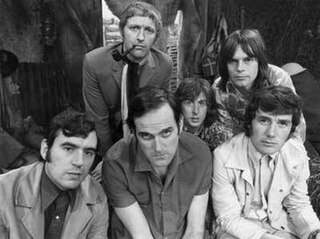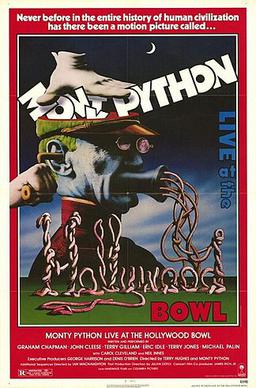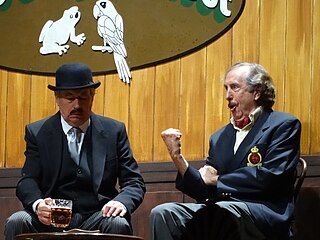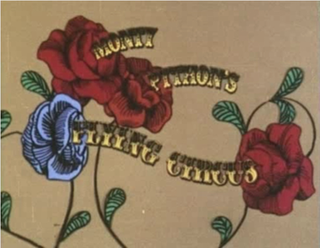Related Research Articles

Monty Python were a British comedy troupe formed in 1969 consisting of Graham Chapman, John Cleese, Terry Gilliam, Eric Idle, Terry Jones, and Michael Palin. The group came to prominence for the sketch comedy series Monty Python's Flying Circus, which aired on the BBC from 1969 to 1974. Their work then developed into a larger collection that included live shows, films, albums, books, and musicals; their influence on comedy has been compared to the Beatles' influence on music. Their sketch show has been called "an important moment in the evolution of television comedy".

The "Dead Parrot Sketch", alternatively and originally known as the "Pet Shop Sketch" or "Parrot Sketch", is a sketch from Monty Python's Flying Circus about a non-existent species of parrot, called a "Norwegian Blue". A satire on poor customer service, it was written by John Cleese and Graham Chapman and initially performed in the show's first series, in the eighth episode.
"Crunchy Frog" is the common name for a Monty Python sketch officially titled "Trade Description Act", inspired by the Trade Descriptions Act 1968 in British law. It features two health inspectors interrogating the owner of a sweet shop about the increasingly bizarre ingredients in his confections, including the titular crunchy frog. Written by John Cleese and Graham Chapman, it originally appeared in episode 6 of the first series of Monty Python's Flying Circus, and later appeared in several Monty Python stage shows. In the original sketch, Cleese and Chapman play the inspectors, while Terry Jones plays the sweet shop owner. In later versions, the second inspector is played by Terry Gilliam or left out of the sketch entirely.

"The Lumberjack Song" is a comedy song by the comedy troupe Monty Python. The song was written and composed by Terry Jones, Michael Palin, and Fred Tomlinson.

Monty Python Live at the Hollywood Bowl is a 1982 concert comedy film directed by Terry Hughes and starring the Monty Python comedy troupe as they perform many of their sketches at the Hollywood Bowl. The film also features Carol Cleveland in numerous supporting roles and Neil Innes performing songs. Also present for the shows and participating as an 'extra' was Python superfan Kim "Howard" Johnson.

And Now for Something Completely Different is a 1971 British sketch comedy film based on the television comedy series Monty Python's Flying Circus featuring sketches from the show's first two series. The title was taken from a catchphrase used in the television show.
The Dirty Fork, also known simply as Restaurant Sketch, is a Monty Python sketch that appeared in episode 3 of the first series of the television series Monty Python's Flying Circus, and later in the film, And Now For Something Completely Different. It is notable for being the first Monty Python sketch wherein the characters react to the audience "booing" them.

Monty Python's Fliegender Zirkus are a pair of 45-minute Monty Python German television comedy specials produced by WDR for West German television. The two episodes were respectively first broadcast in January and December 1972 and were shot entirely on film and mostly on location in Bavaria, with the first episode recorded in German and the second recorded in English and then dubbed into German.

"Candid Photography", better known as "Nudge Nudge", is a sketch from the third Monty Python's Flying Circus episode, "How to Recognise Different Types of Trees From Quite a Long Way Away" featuring Eric Idle and Terry Jones as two strangers who meet in a pub.

Monty Python's Personal Best is a miniseries of six one-hour specials, each showcasing the contributions of a particular Monty Python member. Produced by Python (Monty) Pictures Ltd., the series first aired on PBS stations between 22 February and 8 March 2006, although the Eric Idle and Michael Palin episodes were initially released by A&E on two Region 1 DVDs in 2005; the remaining episodes were released in late February 2006.
Kilimanjaro Expedition is a sketch from the episode of Monty Python's Flying Circus "The Ant, an Introduction", also appearing in the Monty Python film And Now For Something Completely Different. It has been compared to a comic episode in Franz Kafka's The Castle in which the protagonist, K., is confused by twins assigned to assist him.

"Eric the Half-a-Bee" is a song by the British comedy troupe Monty Python that was composed by Eric Idle with lyrics co-written with John Cleese. It first appeared as the A-side of the group's second 7" single, released in a mono mix on 17 November 1972, with a stereo mix appearing three weeks later on the group's third LP Monty Python's Previous Record. On this album, the song followed the routine called "Fish Licence" in which Mr Eric Praline, played by Cleese, tried to obtain a pet licence for an halibut and numerous other pets all named Eric, much to the chagrin of the licence office worker. One such pet is half a bee. The song relates the tale of the half-a-bee, having been "bisected accidentally" by his owner one summer's afternoon.
"Dirty Hungarian Phrasebook" is a Monty Python sketch. It first aired in 1970 on Monty Python's Flying Circus as part of Episode 25, and also appears in the film And Now for Something Completely Different. Atlas Obscura has noted that it may have been inspired by English as She Is Spoke, a 19th-century Portuguese–English phrase book regarded as a classic source of unintentional humour, as the given English translations are generally completely incoherent.
Vocational Guidance Counsellor is a Monty Python sketch that first aired on December 21, 1969, in the episode "Episode 10".

Python Night was an evening of Monty Python-related programmes broadcast on BBC2 on 9 October 1999, to celebrate the 30th anniversary of the first broadcast of Monty Python's Flying Circus. It featured newly written sketches, three documentaries and a screening of Monty Python's Life of Brian.

Monty Python's Flying Circus is a British surreal sketch comedy series created by and starring Graham Chapman, John Cleese, Eric Idle, Terry Jones, Michael Palin, and Terry Gilliam, who became known collectively as "Monty Python", or the "Pythons". The first episode was recorded at the BBC on 7 September 1969 and premiered on 5 October on BBC1, with 45 episodes airing over four series from 1969 to 1974, plus two episodes for German TV. A feature film adaptation of several sketches, And Now for Something Completely Different, was released in 1971.
"The Mouse Problem" is a Monty Python sketch, first aired on 12 October 1969 as part of Sex and Violence, the second episode of the first series of Monty Python's Flying Circus.

The Pythons Autobiography by The Pythons is the official autobiography of the Monty Python team, released in 2003. It covers the whole of Python history, from their childhoods all the way through to the 30th anniversary celebrations in 1999.
References
- ↑ Marriage Counselor, howtobecomeacounselor.org
- ↑ Sex and Violence, BBC
- 1 2 "On this day", Birmingham Post : 8, 5 October 2000
- ↑ Idle, Eric (2018). Always Look on the Bright Side of Life – A Sortabiography. Weidenfeld & Nicolson. p. 47.
- ↑ Douglas L. McCall (1991), Monty Python: a chronological listing of the troupe's creative output, and articles and reviews about them, 1969-1989, p. 13, ISBN 978-0-89950-559-6
- ↑ Robert Ross (1999), Monty Python encyclopedia, p. 126, ISBN 978-1-57500-036-7
- ↑ Rampton, James (15 December 1994), "What came of the odd Python out?", The Independent , London
- ↑ Cornelia Neumann (2007), "6.2.2 Marriage Guidance Counsellor", Nonsense versus Tiefsinn? Ein interkultureller Vergleich des deutschen und englischen Humors am Beispiel der Fernsehsketche von Loriot und Monty Python, GRIN Verlag, p. 45, ISBN 978-3-638-64095-4
- ↑ The complete Monty Python's flying circus, Pantheon Books, 1989, pp. 19–20, ISBN 978-0-679-72647-0
- ↑ Alan Parker, Mick O'Shea (2006), And now for something completely digital, pp. 35–36, ISBN 978-1-932857-31-3